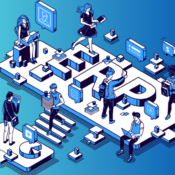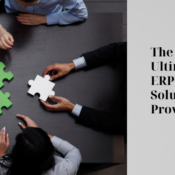How do we select the right ERP solution for our businesses?

04/08/2024
/
How do we select the right ERP solution for our businesses?
In a world where it's super important for businesses to be quick and work together well, finding the perfect Enterprise Resource Planning (ERP) system isn't just something you pick—it's really important for how well your company runs. An ERP system is like the backbone of a company. It links up all the different parts and jobs so that they work together smoothly. But with so many choices out there, how can you figure out which one fits best with how your business works?
Here’s a detailed guide to help you choose the right ERP solution for your business:
What is ERP software?
An Enterprise Resource Planning (ERP) solution functions as a comprehensive suite of integrated applications designed to oversee fundamental business processes, including finance, HR, manufacturing, supply chain, services, procurement, and more, within a unified framework. It acts as the central nexus for managing end-to-end workflows and data, empowering organizations to streamline operations, enhance efficiencies, and attain real-time insights into their operations. Selecting the appropriate ERP solution holds immense significance, as it directly influences an organization's efficiency, flexibility, and financial performance. A well-matched ERP system can lower operational expenses, foster collaboration, and facilitate informed decision-making. Conversely, an ill-suited choice may result in implementation hurdles, escalated expenses, and underutilization of the system.Key Factors to Consider When Choosing an ERP Solution
- Understand your business needs.
- Engage Stakeholders
- Set your budget
- Review your technology
- Consider Scalability
- Check vendor reputation and support
- Request demos and trials
Conclusion
After conducting comprehensive research and evaluation, make a well-informed decision regarding the ERP system that most closely aligns with your business requirements. It's crucial to recognize that the correct ERP solution has the potential to revolutionize your business operations, resulting in heightened efficiency and productivity. By adhering to these steps, you can pinpoint the best ERP solutions for businesses, ensuring they are in line with your organizational objectives and poised to drive success. Remember, while the selection process demands careful planning and consideration, the advantages of implementing the right ERP system are undoubtedly worthwhile.Recent Posts
Monika Narriya/0 Comments
Why are ERP solutions important in the education sector?
Monika Narriya/0 Comments
Which is the best ERP solution provider company?
Monika Narriya/0 Comments
How do we select the right ERP solution for our businesses?
Sumit Kumar/0 Comments
9 Most In-Demand Programming Languages for 2024
Sumit Kumar/0 Comments
Best Time to Post on Social Media – 2024 Guide
Sumit Kumar/0 Comments
Why You Should Consider Semantic HTML for SEO
All Categories
- Bing
- Blockchain
- Blog
- Branding
- Case Study
- Content Marketing
- Conversion Rate Optimization
- Cryptocurrency
- Digital Currency
- Digital Marketing
- Email Marketing
- ERP Solutions
- Facebook Marketing
- Google Ads
- Google Updates
- Graphic Designing
- Hire Developers
- Image SEO
- Influencer Marketing
- IT
- Local SEO
- Machine Learning
- Mobile Application Development
- Pay Per Click
- Pinterest SEO
- Podcast Hosting
- React JS
- Reddit & Quora
- Search Engine Optimization
- SEO Copywriting
- Social Media Marketing
- Software
- Software Development
- Technology
- UX and UI
- Web Designs
- Web Hosting
- Website Development
- Website Redesigning
- YouTube SEO








